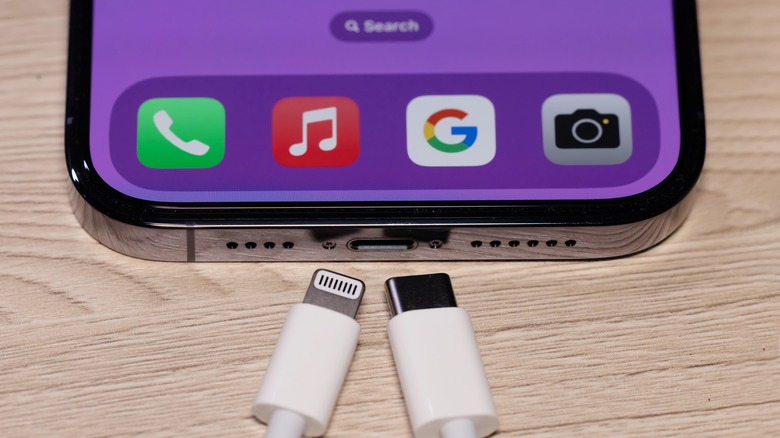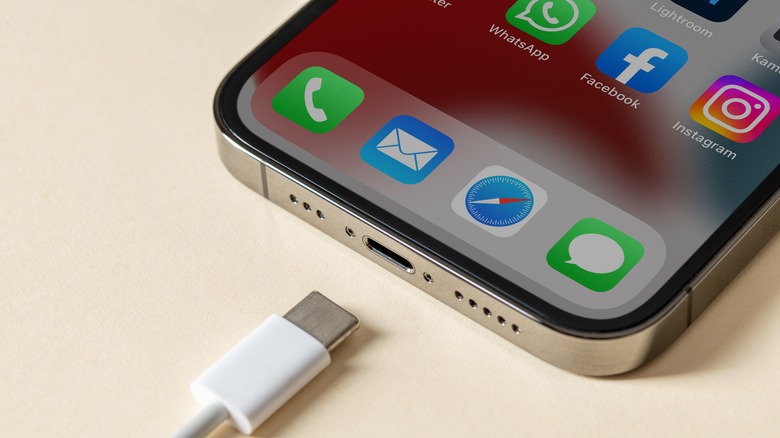iPhone 15's Potential Charging Limits May Bring Trouble For Apple
It's been a while since Apple reluctantly agreed to the EU mandate of switching to a common charging standard. Given that the EU chose USB-C as the brand-agnostic common charging protocol for mobile devices, Apple's entire iPhone 15 lineup will likely switch to USB-C later this year. Shortly after an Apple executive confirmed that Apple is, indeed, making the switch in 2023, noted Apple Ming-Chi Kuo postulated that Apple could potentially throttle the USB transfer/ charging speeds on its lower-priced iPhone models and on accessories that did not conform to Apple's MFI (made for iPhone) standards. While this claim was never confirmed (or denied) by Apple, the EU seems to have taken note.
Earlier this week, the Maltese Member of the European Parliament — Alex Agius Saliba — spoke at a meeting convened by a European Parliamentary Committee known as IMCO (Internal Market and Consumer Protection). At the meeting, Mr. Saliba confirmed that the parliament sees this rumored move as an attempt to "circumvent the single charger rule" mandated by the EU. He also asserted any such move from Apple would be proof that Apple's lobbying against the universal charger mandate was all about reaping profits from their proprietary charging standard. In an animated speech, Alex blamed Apple for making anti-consumer moves under the garb of innovation and fake environmental concern.
Video extract from today's debate on Common charger – developments on new technologies
Watch the full statement by lead MEP @alexagiussaliba (starting at 15.42) & exchange w/ @EU_Commission here 📽️ https://t.co/MDcRY96xk2 https://t.co/Ys5SRuEaGu pic.twitter.com/iDaZJBVH9G
— IMCO Committee Press (@EP_SingleMarket) March 28, 2023
In a separate tweet, Alex also chided Apple for not attending a meeting convened in connection with the single charger mandate. At the meeting, members of the commission were to seek clarification from Apple about the rumored move to limit charging/transfer speed on its USB-C iPhones.
Will Apple face another round of legal troubles in the EU?
Given that Apple has yet to officially confirm or deny the possibility of its lower-priced iPhones getting slower charging speeds, the IMCO hasn't discussed a possible regulatory intervention. IMCO'S major bone of contention is the possibility of Apple implementing a feature that would only allow official Apple USB-C accessories to be used with USB-C iPhones — thereby locking out competing products.
At this point, the IMCO seems unaware of Apple's MFI (Made for iPhone) program, which allows third-party accessory makers to design and manufacture iPhone accessories that conform to Apple's strict quality standards. Apple claims the MFI certification acts as a quality seal and prevents users from ending up with poor-quality devices that could potentially damage its products. However, Apple's intentions behind the MFI program aren't entirely noble, given that the company earns a small commission from the sale of each MFI-certified accessory.
At this point, the IMCO sees these rumored restrictions as an anti-competitive move that completely violates consumer rights. It remains to be seen if the two parties are able to settle these differences before the launch of the iPhone 15 series in September this year.

